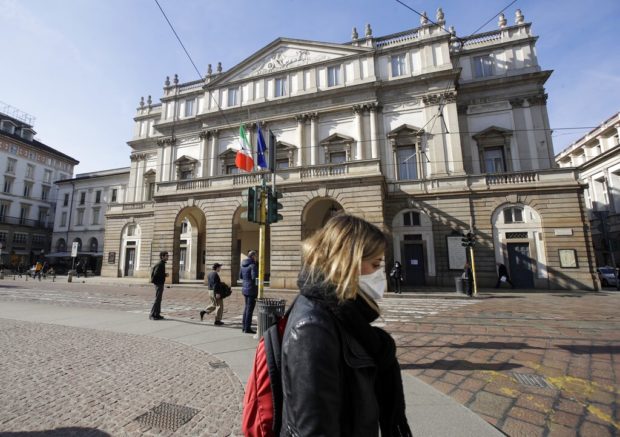La Scala opens virtual tour during coronavirus lockdown
MILAN — Milan’s famed La Scala opera house on Thursday unveiled a virtual journey through its ornate premises and rich archives via Google Arts & Culture, with serendipitous timing as theaters throughout Italy and the western world remain closed due to the coronavirus.

In this Feb. 24, 2020 filer, a woman wearing a sanitary mask walks past La Scala Opera house in Milan, Italy. AP Photo/Luca Bruno, File
The project has been in the works for years, and organizers accelerated it during the coronavirus, knowing there was a captive audience eager for cultural outlets. To herald the event, the La Scala orchestra and artists released a video performance of an excerpt from Verdi’s ”Simon Boccanegra,” with musicians and singers performing in their gardens, living rooms, balconies and studios.
”We are sad not to see the orchestra together, not to see the dancers together, not to see the chorus together, not see the stage hands every day … The theater is a big family,” said Dominique Meyer, La Scala’s general director.
”Or course we can’t wait to return to the theater, but in the meantime we can explore these secrets of the theater and learn things that even we didn’t know,” he added.
The project includes virtual tours of the theater, backstage and museum, along with 240,000 archival photos and 16,000 documents, more than 40 digital exhibits and close-up views of costumes worn by stars such as Maria Callas. Performances of operas are available on another platform through Italy’s RAI state television.
La Scala has been closed since Feb. 23, within days of the first positive case of domestically transmitted coronavirus in Italy. While museums are slated to reopen May 18, the government has yet to indicate an opening date for the theaters in the country that invented the opera. La Scala has proposed reopening with a performance of Verdi’s Requiem in September.
Article continues after this advertisementThe Arena di Verona — an open air theater in a Roman amphitheater — has canceled its hugely popular summer opera festival, but has announced a series of operatic concerts in August with a fraction of its capacity, from 13,500 to just 3,000. The program is still being worked out.